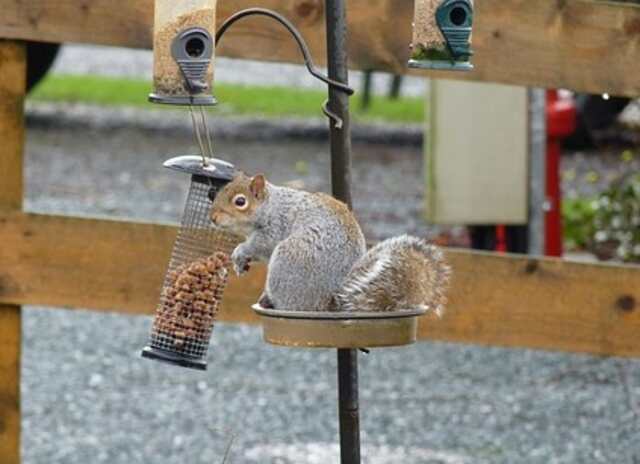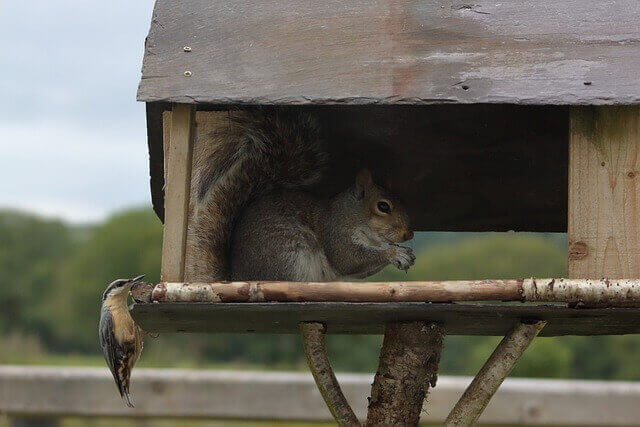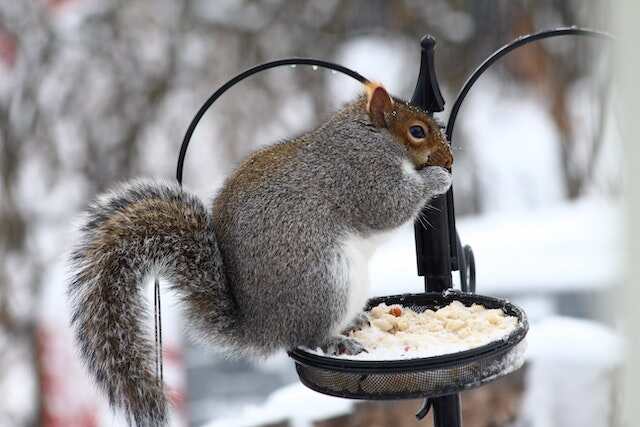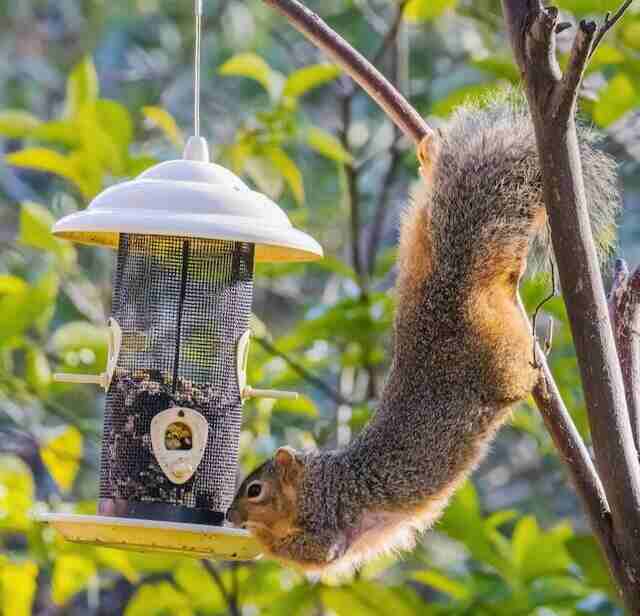Are you tired of squirrels raiding your bird feeders and scaring away your feathered friends? Keeping squirrels out of bird feeders is a common challenge for bird enthusiasts, but there are effective solutions at your disposal. By implementing the right techniques and products, you can create a squirrel-free environment for peaceful bird watching.
In this article, we will guide you through the steps to keep squirrels away from your bird feeders. We will provide insights into squirrel behavior around bird feeders, explore different types of squirrel-resistant bird feeders, and discuss various squirrel-proofing techniques and natural repellents to accomplish your goal. We will also provide tips on maintaining bird feeders and monitoring success to ensure long-term effectiveness.
Table of Contents
- 1 Key Takeaways:
- 2 How to Keep Squirrels Out of Bird Feeder?
- 3 Understanding Squirrel Behavior Around Bird Feeders
- 4 Choosing a Squirrel-Proof Bird Feeder
- 5 Implementing Squirrel-Proofing Techniques
- 6 Building a Squirrel-Proof Bird Feeder Pole
- 7 Natural Squirrel Repellents
- 8 Maintaining a Squirrel-Free Bird Feeder
- 9 Additional Tips and Tricks
- 10 Monitoring Success and Making Adjustments
- 11 Enjoying Bird Watching without Squirrel Nuisance
- 12 Conclusion
- 13 FAQs: How to Keep Squirrels Out of Bird Feeder?
- 13.1 What are some effective squirrel-proofing techniques for bird feeders?
- 13.2 How do squirrel-resistant bird feeders work?
- 13.3 Can natural squirrel repellents be used in combination with other squirrel-proofing methods?
- 13.4 How can I maintain a squirrel-free bird feeder?
- 13.5 Are there any additional tips and tricks for squirrel-proofing bird feeders?
- 13.6 How important is monitoring success and making adjustments in squirrel-proofing?
- 13.7 What are the benefits of maintaining squirrel-free bird feeders?
- 14 Author
Key Takeaways:
- Squirrels can be a nuisance and prevent peaceful bird watching
- Effective squirrel-proofing techniques include squirrel-resistant bird feeders and deterrents
- Natural repellents can be used in conjunction with other methods
- Maintenance and monitoring are vital to ensure squirrel-proofing success

How to Keep Squirrels Out of Bird Feeder?
Squirrels can be a nuisance when they raid bird feeders, but there are several ways to keep them out. One effective method is to use a squirrel-proof bird feeder that is designed to keep squirrels from accessing the food.
Another option is to place the bird feeder on a pole or hanger that is too tall for squirrels to reach. You can also try using a squirrel baffle, which is a device that prevents squirrels from climbing up the pole or hanger.
Additionally, you can try using spicy or bitter birdseed that squirrels are less likely to eat. Finally, you can try using a squirrel repellent spray or electronic device to deter squirrels from the area.
Understanding Squirrel Behavior Around Bird Feeders
Keeping squirrels away from bird feeders can be a challenging task, as they are attracted to the abundance of food and easy access that bird feeders provide. Understanding why squirrels are attracted to bird feeders and how they access them is key to preventing them from eating bird seed.
Squirrels have a strong sense of smell and are attracted to the scent of bird seed, especially sunflower seeds and peanuts. They are also excellent climbers and jumpers, making it easy for them to access bird feeders hanging from branches or on poles.
Squirrels can climb even the smoothest of poles, making it essential to implement effective squirrel-proofing measures.
| Common Squirrel Habits around Bird Feeders | Preventive Measures |
|---|---|
| Squirrels tip over bird feeders and spill seed on the ground. | Use a weight-sensitive feeder that closes off access when a squirrel’s weight is detected. |
| Squirrels climb up poles, trees or walls to access hanging feeders. | Use a squirrel baffle or wrap the pole with a slick material that squirrels cannot grip. |
| Squirrels chew through plastic or wooden feeders to access seed. | Use a metal feeder or a cage feeder that allows only small birds to access the seed. |
| Squirrels scare birds away from feeders. | Install alternate feeding stations for squirrels to divert their attention away from bird feeders. |
Preventing squirrels from eating bird seed not only protects the feeder, but also the birds that rely on it as a food source. By understanding squirrel behavior around bird feeders and implementing effective squirrel-proofing measures, we can enjoy bird watching without the disturbance of squirrels.
Choosing a Squirrel-Proof Bird Feeder
When looking for a squirrel-resistant bird feeder, it’s important to consider the features that make it difficult for squirrels to access the food. Here are some of the key things to look for:
| Feature | Description |
|---|---|
| Weight-sensitive mechanism | This type of feeder is designed to close its feeding ports when a squirrel’s weight is detected. This prevents the squirrel from getting into the feeder and stealing the food. |
| Cage design | A cage surrounding the feeding ports can keep squirrels out while allowing birds to access the food. The cage should have narrow openings that only allow small birds to enter. |
| Adjustable perches | Some feeders have perches that can be adjusted to different lengths. This allows you to create a feeder that only accommodates birds of a certain size, effectively keeping squirrels out. |
When choosing a squirrel-resistant bird feeder, it’s also important to consider the material it’s made of. Opt for a feeder made of sturdy, chew-proof materials like metal or high-density plastic. Avoid wooden feeders, which can be easily damaged by squirrels.
Some reliable brands that offer squirrel-proofing bird feeders include Droll Yankees, Brome, and Perky-Pet. These brands offer a variety of feeder types, so you can choose the best one for your needs.

Implementing Squirrel-Proofing Techniques
If you have already tried squirrel-resistant bird feeders and still find squirrels raiding your bird seed, it’s time to take further action. Implementing additional squirrel-proofing techniques can help ensure squirrel-free bird feeders.
One effective solution is installing a bird feeder squirrel baffle. A baffle is a cone-shaped or cylindrical device placed around the bird feeder pole. It prevents squirrels from climbing up the pole and accessing the feeder. Choose a baffle made of durable material and easy to install, such as metal or plastic.
Another technique is using squirrel deterrents specially designed for bird feeders. These products come in different forms, from sprays to powders to granules, and are applied directly to the bird seed. They are usually made with natural ingredients like cayenne pepper or garlic, which squirrels find unappetizing while being harmless to birds.
You can also try motion-activated devices that emit high-pitched sounds or spray water. These devices startle squirrels and drive them away, but they can also scare birds, so use them with caution in areas with high bird activity.
Whatever technique you choose, make sure to follow the instructions provided by the manufacturer. Remember that squirrels are persistent animals that can adapt quickly, so it may take time and experimentation to find the most suitable solution for your bird feeding station.
Building a Squirrel-Proof Bird Feeder Pole
If you’re looking for a cost-effective and personalized approach to squirrel-proofing your bird feeder, constructing a DIY squirrel-proof bird feeder pole might be the right solution. Here are the steps to follow:
- Choose your materials: You will need a metal conduit pipe, a metal flange, nuts and bolts, an end cap, PVC pipe, a PVC elbow, and a few metal washers.
- Cut the metal conduit pipe: Cut the conduit pipe to the desired length with a hacksaw. Typically, a length of 6-8 feet is ideal. Be sure to wear protective gloves when handling the pipe.
- Attach the metal flange: Secure the metal flange to the bottom of the pole using nuts and bolts. Make sure it’s level and sturdy.
- Insert the PVC pipe: Insert the PVC pipe into the metal conduit pipe. This will serve as the squirrel baffle.
- Add the elbow: Attach the PVC elbow to the top of the PVC pipe. This will be where you hang the bird feeder.
- Secure the end cap: Attach the end cap to the top of the metal conduit pipe to prevent water from getting inside.
- Add washers: To prevent squirrels from climbing up the pole, add a few metal washers between the PVC pipe and metal conduit pipe. This will make it difficult for squirrels to gain a foothold.
- Install the pole: Dig a hole deep enough to hold the pole and place it securely in the ground. Make sure it’s level and sturdy.
With this DIY squirrel-proof bird feeder pole, you can enjoy bird watching without the nuisance of squirrels. Don’t forget to regularly check and adjust the pole as necessary to maintain its effectiveness.
Natural Squirrel Repellents
In addition to physical barriers and deterrent devices, natural squirrel repellents can also be effective in keeping squirrels away from bird feeders. These repellents work by making the bird seed unappealing or unpleasant for squirrels to eat.
One popular method is to use cayenne pepper, which can be sprinkled on top of bird feeders, mixed in with seeds, or added to water in a spray bottle and applied to the surrounding area. The spicy scent and taste of cayenne pepper is unpleasant for squirrels, but harmless for birds.
Another natural repellent is vinegar, which can be mixed with water and sprayed onto bird feeders and surrounding surfaces. The strong scent and taste of vinegar can deter squirrels from approaching the area.
Additionally, predator scents such as fox urine or coyote urine can be used as a natural deterrent. These scents mimic the presence of natural predators, which can intimidate squirrels and keep them away from bird feeders. However, it is important to note that predator scents may also repel birds, so it should be used with caution and sparingly.
While natural squirrel repellents can be effective, it is important to remember that they may need to be reapplied regularly to maintain their effectiveness.
By implementing natural squirrel repellents along with other squirrel-proofing techniques, bird watchers can enjoy a squirrel-free bird feeding experience and prevent squirrels from eating bird seed.

Maintaining a Squirrel-Free Bird Feeder
Once the squirrel-proofing measures have been put in place, it is important to maintain and monitor the success of the bird feeder. Keeping squirrels away from bird feeders requires consistent efforts and attention to detail.
The bird feeder should be regularly cleaned to prevent any buildup of debris or mold. Dirty feeders can attract unwanted pests and lead to the spread of disease. A clean feeder also ensures a fresh and healthy food source for birds.
Seed management is also crucial in maintaining a squirrel-free bird feeder. Seed spillage attracts squirrels and other critters, so it is important to choose a feeder that minimizes spilling. Additionally, selective seed offerings like safflower seed or nyjer seed are less attractive to squirrels than sunflower seeds.
Observation is key in determining the effectiveness of the chosen squirrel deterrent methods. If squirrels are still accessing the feeder, adjustments may be necessary. It is important to identify any loopholes and fine-tune the chosen methods to ensure a long-term squirrel-free feeder.
Overall, a consistent effort to keep squirrels away from bird feeders is essential in maintaining a healthy and enjoyable bird watching experience.
Additional Tips and Tricks
When it comes to squirrel-resistant bird feeders, there are a few additional tips and tricks that can further enhance your efforts:
- Strategic placement: Consider placing your bird feeder away from trees or structures that squirrels can climb or jump from.
- Selective seed offerings: Some bird seed blends are less appealing to squirrels, such as safflower seeds or nyjer seeds. Experiment with different seed types to find the ones that attract birds and repel squirrels.
- Alternate feeding stations: Setting up a separate feeding station for squirrels can redirect their attention away from the bird feeder. Consider using a squirrel feeder or placing a tray with nuts or corn a distance away from the bird feeder.
By implementing these additional tips and tricks, you can further increase the effectiveness of your squirrel-proofing methods and enjoy a squirrel-free bird watching experience.
Monitoring Success and Making Adjustments
Once you have implemented squirrel-proofing techniques, it is crucial to regularly monitor their effectiveness and make necessary adjustments. Squirrels can be persistent and resourceful, and may find new ways to access your bird feeder over time.
One way to monitor success is to observe the feeder and surrounding area from a distance, noting any signs of squirrel activity. If you notice that squirrels are still getting to the feeder, try adjusting the placement of the feeder, or adding more squirrel baffles or deterrents.
Another way to monitor success is to check the feeder itself. If the seeds are consistently disappearing too quickly, it may indicate that squirrels are still accessing the feeder. In this case, consider adding more squirrel-proofing measures or adjusting the types of seeds offered.
Remember to stay patient and persistent in your squirrel-proofing efforts. It may take some trial and error to find the most effective combination of methods for your specific situation.
By monitoring and adjusting your squirrel-proofing measures, you can enjoy a peaceful and squirrel-free bird watching experience.

Enjoying Bird Watching without Squirrel Nuisance
By implementing effective squirrel-proofing techniques, you can enjoy the pleasure of bird watching without the annoyance of squirrels. A squirrel-resistant bird feeder can be a great investment for any bird enthusiast.
Choosing the right bird feeder is crucial for squirrel-proofing. Look for feeders with weight-sensitive mechanisms or adjustable perches that block access to squirrels. Consider reputable brands such as Brome or Droll Yankees for reliable options.
Implementing squirrel-proofing techniques is also vital. Squirrel baffles can prevent squirrels from climbing poles or trees to reach the feeder. Other deterrents such as hot pepper solutions or motion-activated devices can also be effective.
Building a squirrel-proof bird feeder pole is a cost-effective DIY approach that can be tailored to your specific needs. Natural repellents such as cayenne pepper, vinegar, or predator scents can also be used in conjunction with other squirrel-proofing methods.
Maintaining a squirrel-free bird feeder requires regular cleaning practices and seed management techniques. Strategic feeder placement, selective seed offerings, and alternate feeding stations for squirrels can also enhance the effectiveness of squirrel-proofing techniques.
By monitoring the success of squirrel-proofing measures and making necessary adjustments, you can ensure long-term effectiveness. With the right techniques and products in place, you can enjoy the beauty and diversity of birds in your backyard without the nuisance of squirrels.
Conclusion
Implementing squirrel-proofing techniques is essential for enhancing the bird watching experience. By understanding squirrel behavior and choosing the right equipment, bird lovers can successfully keep squirrels away from bird feeders.
Regular maintenance and monitoring the efficacy of the chosen methods are crucial for keeping the bird feeders squirrel-free in the long term. Using natural squirrel repellents and creating alternate feeding stations can further augment squirrel-proofing efforts.
Enjoying bird watching without the nuisance of squirrels not only increases the diversity of bird species but also provides a peaceful observation opportunity. Start implementing squirrel-proofing techniques and enjoy the pleasure of bird feeders without squirrel interference today.

FAQs: How to Keep Squirrels Out of Bird Feeder?
What are some effective squirrel-proofing techniques for bird feeders?
Some effective squirrel-proofing techniques for bird feeders include installing squirrel baffles, using weight-sensitive mechanisms on feeders, and using motion-activated devices.
How do squirrel-resistant bird feeders work?
Squirrel-resistant bird feeders are designed with features such as weight-sensitive mechanisms or cages that prevent squirrels from accessing the bird seed while still allowing birds to feed.
Can natural squirrel repellents be used in combination with other squirrel-proofing methods?
Yes, natural squirrel repellents like cayenne pepper or predator scents can be used in conjunction with other squirrel-proofing methods to further deter squirrels from accessing bird feeders.
How can I maintain a squirrel-free bird feeder?
Regular cleaning practices, proper seed management, and observation are key to maintaining a squirrel-free bird feeder. Ensuring the effectiveness of squirrel deterrent methods requires ongoing maintenance.
Are there any additional tips and tricks for squirrel-proofing bird feeders?
Yes, strategic feeder placement, offering selective seed options, and providing alternate feeding stations for squirrels can help enhance squirrel-proofing efforts.
How important is monitoring success and making adjustments in squirrel-proofing?
Monitoring the success of squirrel-proofing measures and making necessary adjustments is crucial to ensure long-term effectiveness. This helps identify any possible loopholes and fine-tune the chosen methods.
What are the benefits of maintaining squirrel-free bird feeders?
Maintaining squirrel-free bird feeders can lead to increased bird species diversity and provide peaceful observation opportunities for bird watchers.



